Analyzing Contract Law, Director's Duties in Legal Aspects of Business
VerifiedAdded on 2023/06/14
|14
|3561
|361
Case Study
AI Summary
This case study delves into two primary legal issues within a business context. The first part examines whether Supreme Phones Ltd can rely on an exemption clause in their contract with Oscar, focusing on principles of contract law, incorporation by signature, notice, and prior dealings, referencing key cases like Thornton v Shoe Lane Parking Ltd. The analysis concludes that Supreme Phones Ltd likely cannot rely on the clause due to Oscar's lack of awareness. The second part addresses Oscar's potential breach of director duties under the Corporation Act 2001, specifically concerning conflicts of interest and acting in good faith for the company's best interests, citing sections 191, 180, 183, 184, and 1317E, and cases like ASIC v Adler. It concludes that Oscar may face termination and penalties for failing to disclose his property interests and neglecting his duties. Finally, the case touches upon liabilities and remedies under CIF contracts, emphasizing the duties of sellers to provide shipment documents and insurance, referencing Ross T Smyth v TD Bailey and Hanson v Hamel and Horley Ltd. Desklib provides students with access to similar solved assignments and past papers for further study.
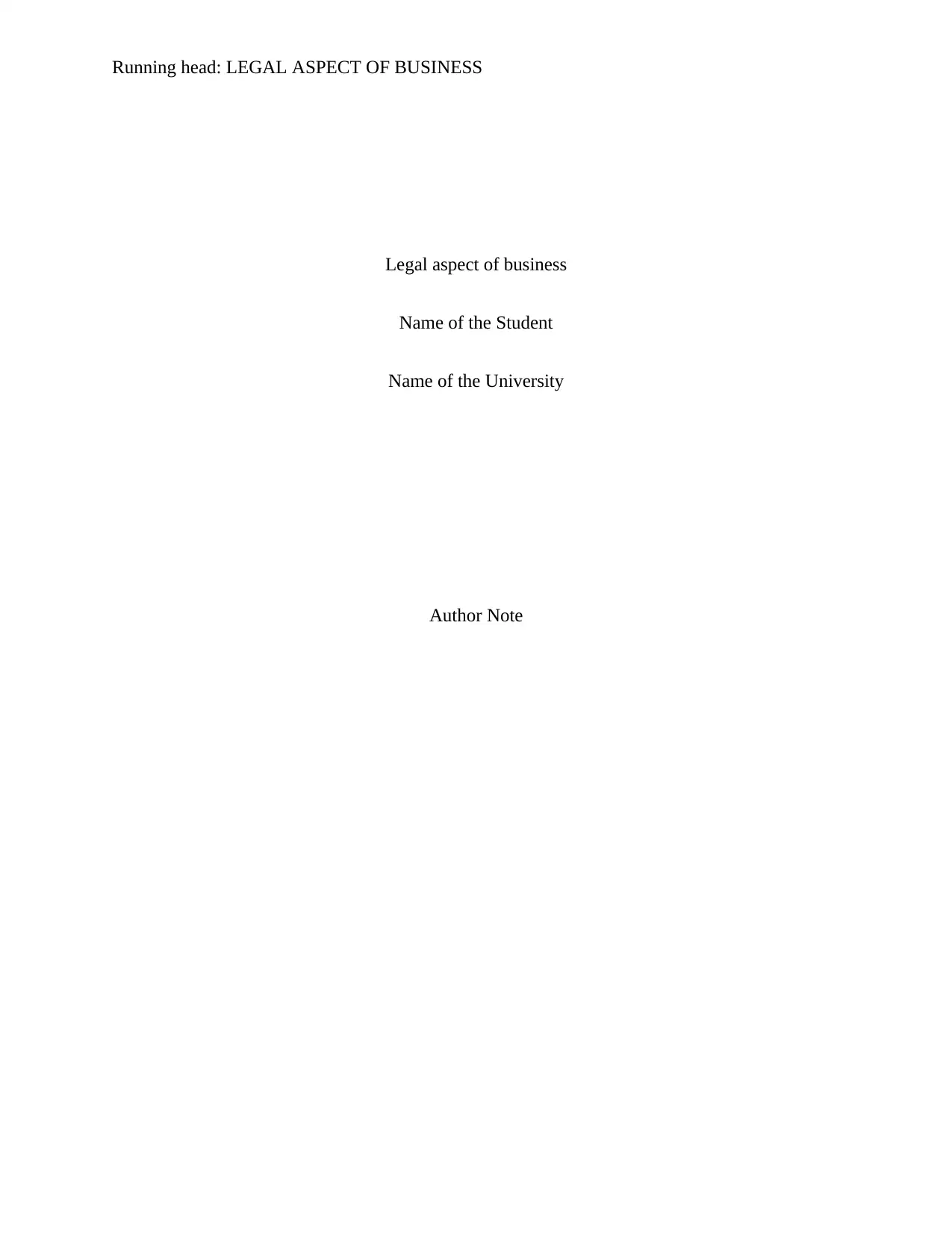
Running head: LEGAL ASPECT OF BUSINESS
Legal aspect of business
Name of the Student
Name of the University
Author Note
Legal aspect of business
Name of the Student
Name of the University
Author Note
Paraphrase This Document
Need a fresh take? Get an instant paraphrase of this document with our AI Paraphraser
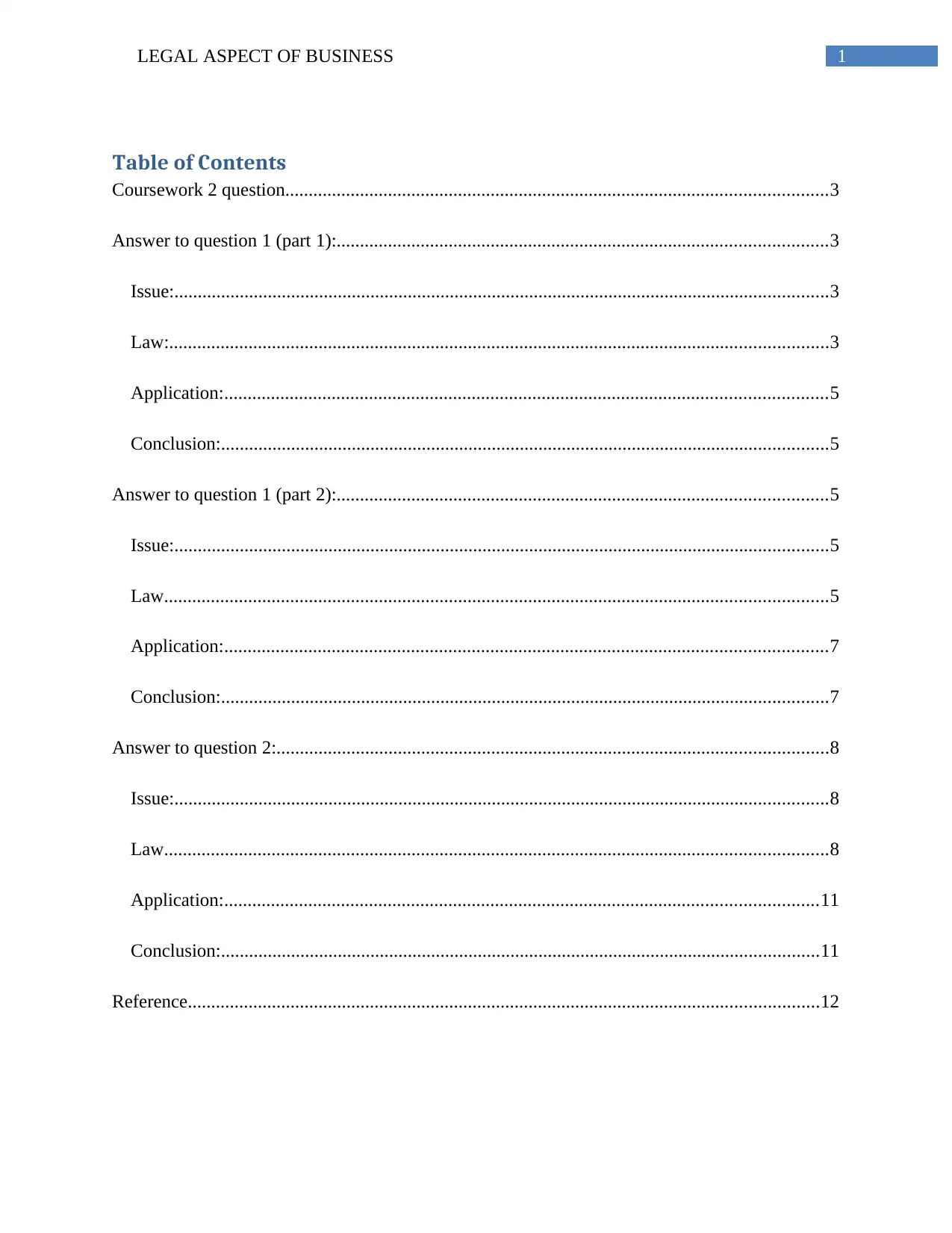
1LEGAL ASPECT OF BUSINESS
Table of Contents
Coursework 2 question....................................................................................................................3
Answer to question 1 (part 1):.........................................................................................................3
Issue:............................................................................................................................................3
Law:.............................................................................................................................................3
Application:.................................................................................................................................5
Conclusion:..................................................................................................................................5
Answer to question 1 (part 2):.........................................................................................................5
Issue:............................................................................................................................................5
Law..............................................................................................................................................5
Application:.................................................................................................................................7
Conclusion:..................................................................................................................................7
Answer to question 2:......................................................................................................................8
Issue:............................................................................................................................................8
Law..............................................................................................................................................8
Application:...............................................................................................................................11
Conclusion:................................................................................................................................11
Reference.......................................................................................................................................12
Table of Contents
Coursework 2 question....................................................................................................................3
Answer to question 1 (part 1):.........................................................................................................3
Issue:............................................................................................................................................3
Law:.............................................................................................................................................3
Application:.................................................................................................................................5
Conclusion:..................................................................................................................................5
Answer to question 1 (part 2):.........................................................................................................5
Issue:............................................................................................................................................5
Law..............................................................................................................................................5
Application:.................................................................................................................................7
Conclusion:..................................................................................................................................7
Answer to question 2:......................................................................................................................8
Issue:............................................................................................................................................8
Law..............................................................................................................................................8
Application:...............................................................................................................................11
Conclusion:................................................................................................................................11
Reference.......................................................................................................................................12

2LEGAL ASPECT OF BUSINESS
⊘ This is a preview!⊘
Do you want full access?
Subscribe today to unlock all pages.

Trusted by 1+ million students worldwide
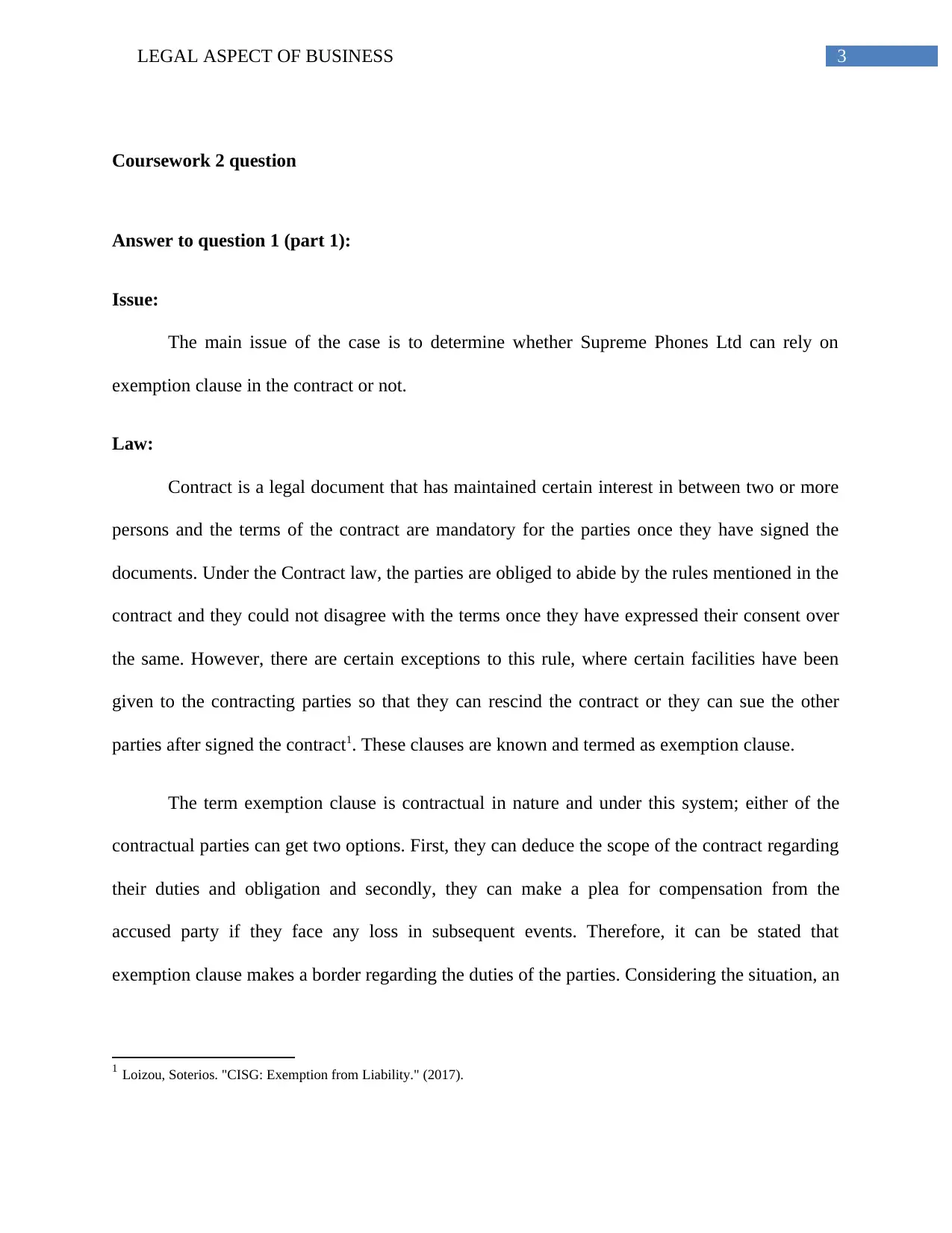
3LEGAL ASPECT OF BUSINESS
Coursework 2 question
Answer to question 1 (part 1):
Issue:
The main issue of the case is to determine whether Supreme Phones Ltd can rely on
exemption clause in the contract or not.
Law:
Contract is a legal document that has maintained certain interest in between two or more
persons and the terms of the contract are mandatory for the parties once they have signed the
documents. Under the Contract law, the parties are obliged to abide by the rules mentioned in the
contract and they could not disagree with the terms once they have expressed their consent over
the same. However, there are certain exceptions to this rule, where certain facilities have been
given to the contracting parties so that they can rescind the contract or they can sue the other
parties after signed the contract1. These clauses are known and termed as exemption clause.
The term exemption clause is contractual in nature and under this system; either of the
contractual parties can get two options. First, they can deduce the scope of the contract regarding
their duties and obligation and secondly, they can make a plea for compensation from the
accused party if they face any loss in subsequent events. Therefore, it can be stated that
exemption clause makes a border regarding the duties of the parties. Considering the situation, an
1 Loizou, Soterios. "CISG: Exemption from Liability." (2017).
Coursework 2 question
Answer to question 1 (part 1):
Issue:
The main issue of the case is to determine whether Supreme Phones Ltd can rely on
exemption clause in the contract or not.
Law:
Contract is a legal document that has maintained certain interest in between two or more
persons and the terms of the contract are mandatory for the parties once they have signed the
documents. Under the Contract law, the parties are obliged to abide by the rules mentioned in the
contract and they could not disagree with the terms once they have expressed their consent over
the same. However, there are certain exceptions to this rule, where certain facilities have been
given to the contracting parties so that they can rescind the contract or they can sue the other
parties after signed the contract1. These clauses are known and termed as exemption clause.
The term exemption clause is contractual in nature and under this system; either of the
contractual parties can get two options. First, they can deduce the scope of the contract regarding
their duties and obligation and secondly, they can make a plea for compensation from the
accused party if they face any loss in subsequent events. Therefore, it can be stated that
exemption clause makes a border regarding the duties of the parties. Considering the situation, an
1 Loizou, Soterios. "CISG: Exemption from Liability." (2017).
Paraphrase This Document
Need a fresh take? Get an instant paraphrase of this document with our AI Paraphraser
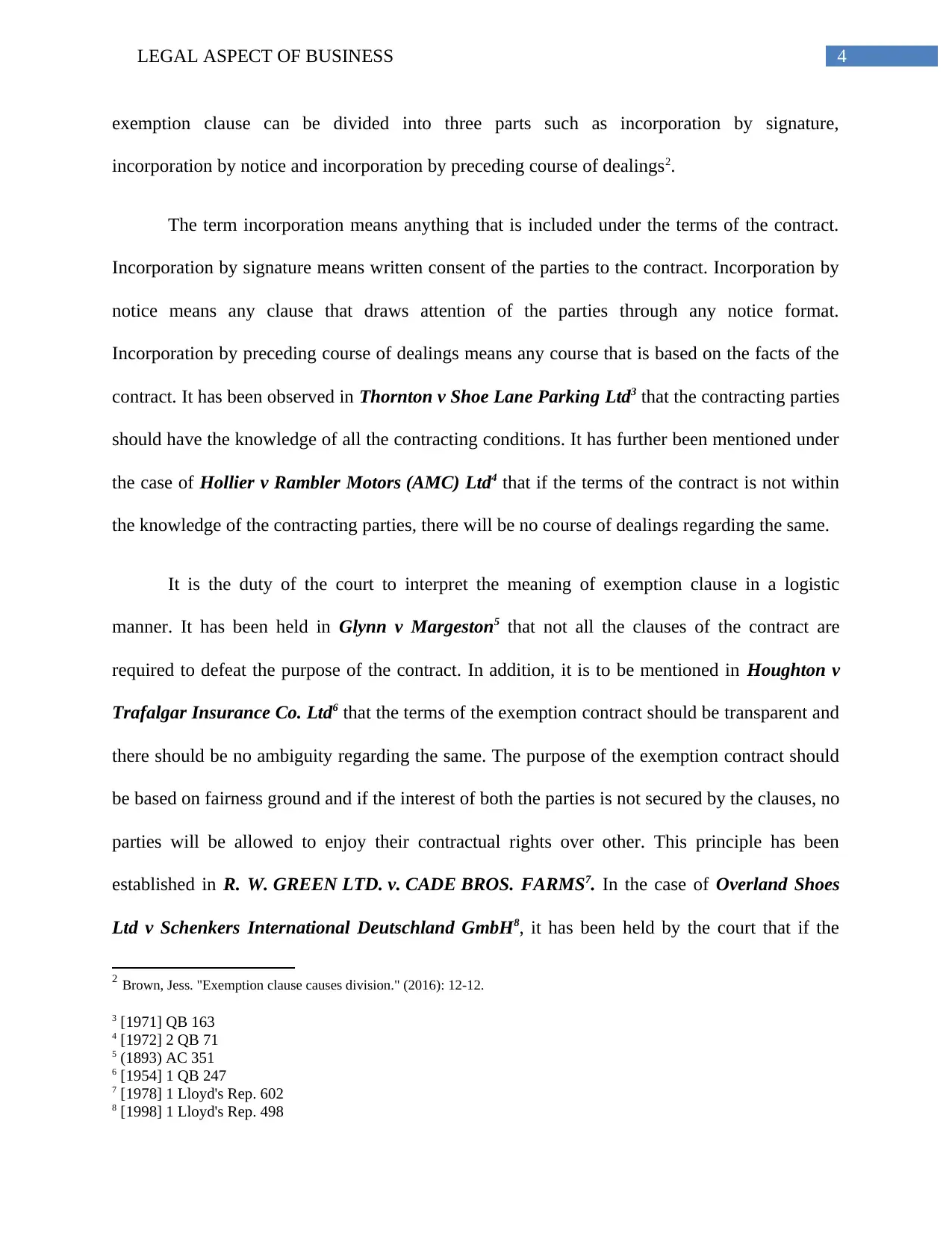
4LEGAL ASPECT OF BUSINESS
exemption clause can be divided into three parts such as incorporation by signature,
incorporation by notice and incorporation by preceding course of dealings2.
The term incorporation means anything that is included under the terms of the contract.
Incorporation by signature means written consent of the parties to the contract. Incorporation by
notice means any clause that draws attention of the parties through any notice format.
Incorporation by preceding course of dealings means any course that is based on the facts of the
contract. It has been observed in Thornton v Shoe Lane Parking Ltd3 that the contracting parties
should have the knowledge of all the contracting conditions. It has further been mentioned under
the case of Hollier v Rambler Motors (AMC) Ltd4 that if the terms of the contract is not within
the knowledge of the contracting parties, there will be no course of dealings regarding the same.
It is the duty of the court to interpret the meaning of exemption clause in a logistic
manner. It has been held in Glynn v Margeston5 that not all the clauses of the contract are
required to defeat the purpose of the contract. In addition, it is to be mentioned in Houghton v
Trafalgar Insurance Co. Ltd6 that the terms of the exemption contract should be transparent and
there should be no ambiguity regarding the same. The purpose of the exemption contract should
be based on fairness ground and if the interest of both the parties is not secured by the clauses, no
parties will be allowed to enjoy their contractual rights over other. This principle has been
established in R. W. GREEN LTD. v. CADE BROS. FARMS7. In the case of Overland Shoes
Ltd v Schenkers International Deutschland GmbH8, it has been held by the court that if the
2 Brown, Jess. "Exemption clause causes division." (2016): 12-12.
3 [1971] QB 163
4 [1972] 2 QB 71
5 (1893) AC 351
6 [1954] 1 QB 247
7 [1978] 1 Lloyd's Rep. 602
8 [1998] 1 Lloyd's Rep. 498
exemption clause can be divided into three parts such as incorporation by signature,
incorporation by notice and incorporation by preceding course of dealings2.
The term incorporation means anything that is included under the terms of the contract.
Incorporation by signature means written consent of the parties to the contract. Incorporation by
notice means any clause that draws attention of the parties through any notice format.
Incorporation by preceding course of dealings means any course that is based on the facts of the
contract. It has been observed in Thornton v Shoe Lane Parking Ltd3 that the contracting parties
should have the knowledge of all the contracting conditions. It has further been mentioned under
the case of Hollier v Rambler Motors (AMC) Ltd4 that if the terms of the contract is not within
the knowledge of the contracting parties, there will be no course of dealings regarding the same.
It is the duty of the court to interpret the meaning of exemption clause in a logistic
manner. It has been held in Glynn v Margeston5 that not all the clauses of the contract are
required to defeat the purpose of the contract. In addition, it is to be mentioned in Houghton v
Trafalgar Insurance Co. Ltd6 that the terms of the exemption contract should be transparent and
there should be no ambiguity regarding the same. The purpose of the exemption contract should
be based on fairness ground and if the interest of both the parties is not secured by the clauses, no
parties will be allowed to enjoy their contractual rights over other. This principle has been
established in R. W. GREEN LTD. v. CADE BROS. FARMS7. In the case of Overland Shoes
Ltd v Schenkers International Deutschland GmbH8, it has been held by the court that if the
2 Brown, Jess. "Exemption clause causes division." (2016): 12-12.
3 [1971] QB 163
4 [1972] 2 QB 71
5 (1893) AC 351
6 [1954] 1 QB 247
7 [1978] 1 Lloyd's Rep. 602
8 [1998] 1 Lloyd's Rep. 498
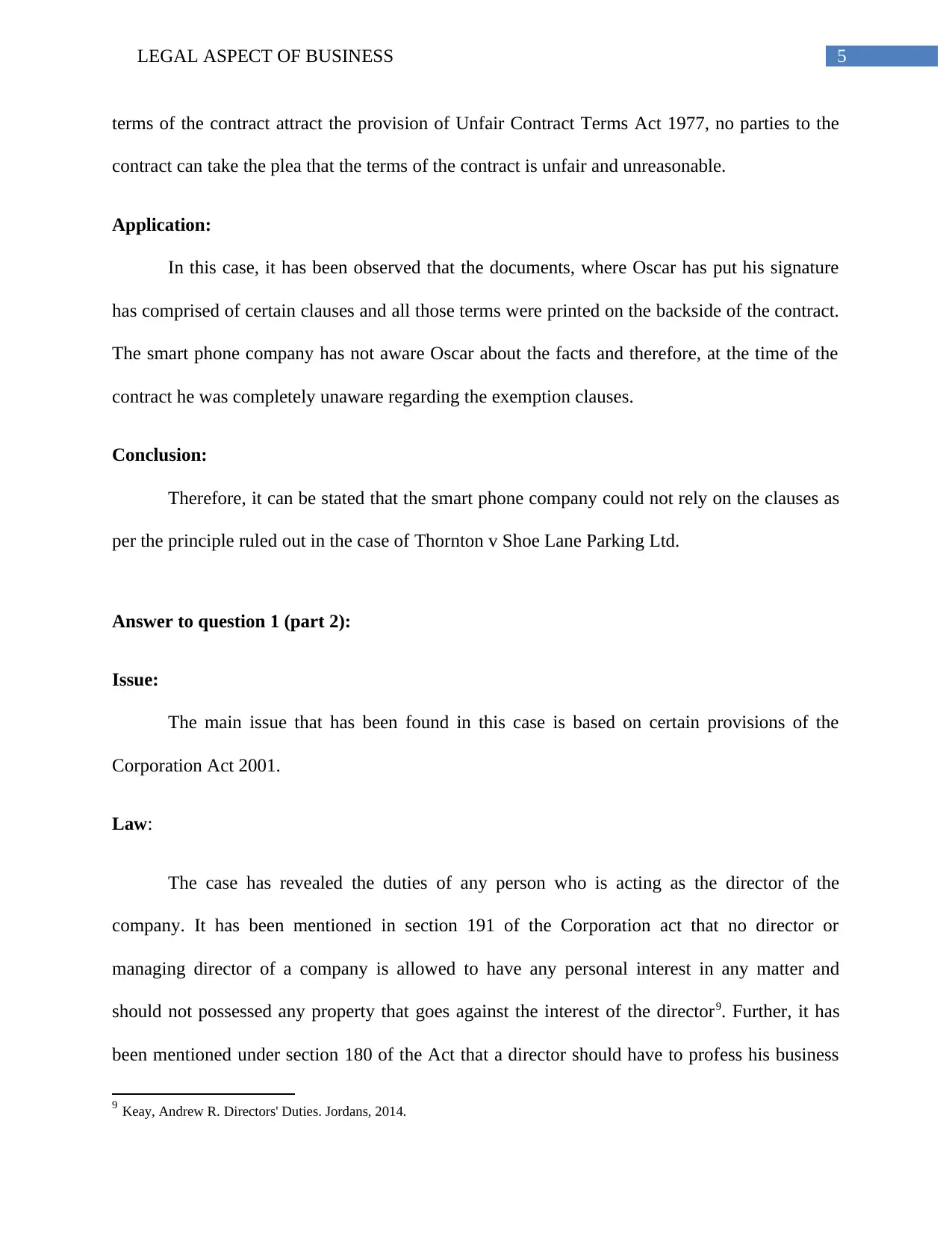
5LEGAL ASPECT OF BUSINESS
terms of the contract attract the provision of Unfair Contract Terms Act 1977, no parties to the
contract can take the plea that the terms of the contract is unfair and unreasonable.
Application:
In this case, it has been observed that the documents, where Oscar has put his signature
has comprised of certain clauses and all those terms were printed on the backside of the contract.
The smart phone company has not aware Oscar about the facts and therefore, at the time of the
contract he was completely unaware regarding the exemption clauses.
Conclusion:
Therefore, it can be stated that the smart phone company could not rely on the clauses as
per the principle ruled out in the case of Thornton v Shoe Lane Parking Ltd.
Answer to question 1 (part 2):
Issue:
The main issue that has been found in this case is based on certain provisions of the
Corporation Act 2001.
Law:
The case has revealed the duties of any person who is acting as the director of the
company. It has been mentioned in section 191 of the Corporation act that no director or
managing director of a company is allowed to have any personal interest in any matter and
should not possessed any property that goes against the interest of the director9. Further, it has
been mentioned under section 180 of the Act that a director should have to profess his business
9 Keay, Andrew R. Directors' Duties. Jordans, 2014.
terms of the contract attract the provision of Unfair Contract Terms Act 1977, no parties to the
contract can take the plea that the terms of the contract is unfair and unreasonable.
Application:
In this case, it has been observed that the documents, where Oscar has put his signature
has comprised of certain clauses and all those terms were printed on the backside of the contract.
The smart phone company has not aware Oscar about the facts and therefore, at the time of the
contract he was completely unaware regarding the exemption clauses.
Conclusion:
Therefore, it can be stated that the smart phone company could not rely on the clauses as
per the principle ruled out in the case of Thornton v Shoe Lane Parking Ltd.
Answer to question 1 (part 2):
Issue:
The main issue that has been found in this case is based on certain provisions of the
Corporation Act 2001.
Law:
The case has revealed the duties of any person who is acting as the director of the
company. It has been mentioned in section 191 of the Corporation act that no director or
managing director of a company is allowed to have any personal interest in any matter and
should not possessed any property that goes against the interest of the director9. Further, it has
been mentioned under section 180 of the Act that a director should have to profess his business
9 Keay, Andrew R. Directors' Duties. Jordans, 2014.
⊘ This is a preview!⊘
Do you want full access?
Subscribe today to unlock all pages.

Trusted by 1+ million students worldwide
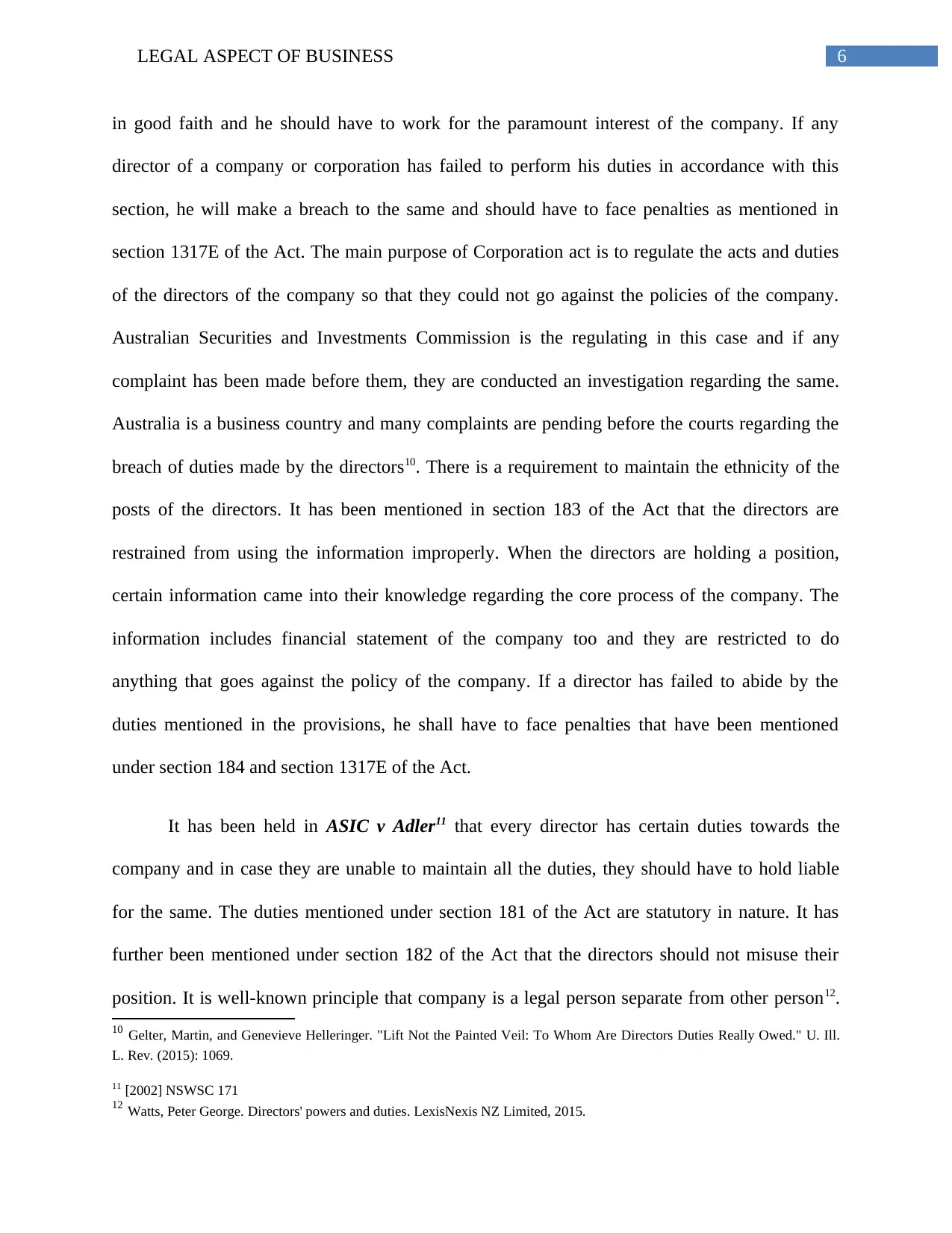
6LEGAL ASPECT OF BUSINESS
in good faith and he should have to work for the paramount interest of the company. If any
director of a company or corporation has failed to perform his duties in accordance with this
section, he will make a breach to the same and should have to face penalties as mentioned in
section 1317E of the Act. The main purpose of Corporation act is to regulate the acts and duties
of the directors of the company so that they could not go against the policies of the company.
Australian Securities and Investments Commission is the regulating in this case and if any
complaint has been made before them, they are conducted an investigation regarding the same.
Australia is a business country and many complaints are pending before the courts regarding the
breach of duties made by the directors10. There is a requirement to maintain the ethnicity of the
posts of the directors. It has been mentioned in section 183 of the Act that the directors are
restrained from using the information improperly. When the directors are holding a position,
certain information came into their knowledge regarding the core process of the company. The
information includes financial statement of the company too and they are restricted to do
anything that goes against the policy of the company. If a director has failed to abide by the
duties mentioned in the provisions, he shall have to face penalties that have been mentioned
under section 184 and section 1317E of the Act.
It has been held in ASIC v Adler11 that every director has certain duties towards the
company and in case they are unable to maintain all the duties, they should have to hold liable
for the same. The duties mentioned under section 181 of the Act are statutory in nature. It has
further been mentioned under section 182 of the Act that the directors should not misuse their
position. It is well-known principle that company is a legal person separate from other person12.
10 Gelter, Martin, and Genevieve Helleringer. "Lift Not the Painted Veil: To Whom Are Directors Duties Really Owed." U. Ill.
L. Rev. (2015): 1069.
11 [2002] NSWSC 171
12 Watts, Peter George. Directors' powers and duties. LexisNexis NZ Limited, 2015.
in good faith and he should have to work for the paramount interest of the company. If any
director of a company or corporation has failed to perform his duties in accordance with this
section, he will make a breach to the same and should have to face penalties as mentioned in
section 1317E of the Act. The main purpose of Corporation act is to regulate the acts and duties
of the directors of the company so that they could not go against the policies of the company.
Australian Securities and Investments Commission is the regulating in this case and if any
complaint has been made before them, they are conducted an investigation regarding the same.
Australia is a business country and many complaints are pending before the courts regarding the
breach of duties made by the directors10. There is a requirement to maintain the ethnicity of the
posts of the directors. It has been mentioned in section 183 of the Act that the directors are
restrained from using the information improperly. When the directors are holding a position,
certain information came into their knowledge regarding the core process of the company. The
information includes financial statement of the company too and they are restricted to do
anything that goes against the policy of the company. If a director has failed to abide by the
duties mentioned in the provisions, he shall have to face penalties that have been mentioned
under section 184 and section 1317E of the Act.
It has been held in ASIC v Adler11 that every director has certain duties towards the
company and in case they are unable to maintain all the duties, they should have to hold liable
for the same. The duties mentioned under section 181 of the Act are statutory in nature. It has
further been mentioned under section 182 of the Act that the directors should not misuse their
position. It is well-known principle that company is a legal person separate from other person12.
10 Gelter, Martin, and Genevieve Helleringer. "Lift Not the Painted Veil: To Whom Are Directors Duties Really Owed." U. Ill.
L. Rev. (2015): 1069.
11 [2002] NSWSC 171
12 Watts, Peter George. Directors' powers and duties. LexisNexis NZ Limited, 2015.
Paraphrase This Document
Need a fresh take? Get an instant paraphrase of this document with our AI Paraphraser
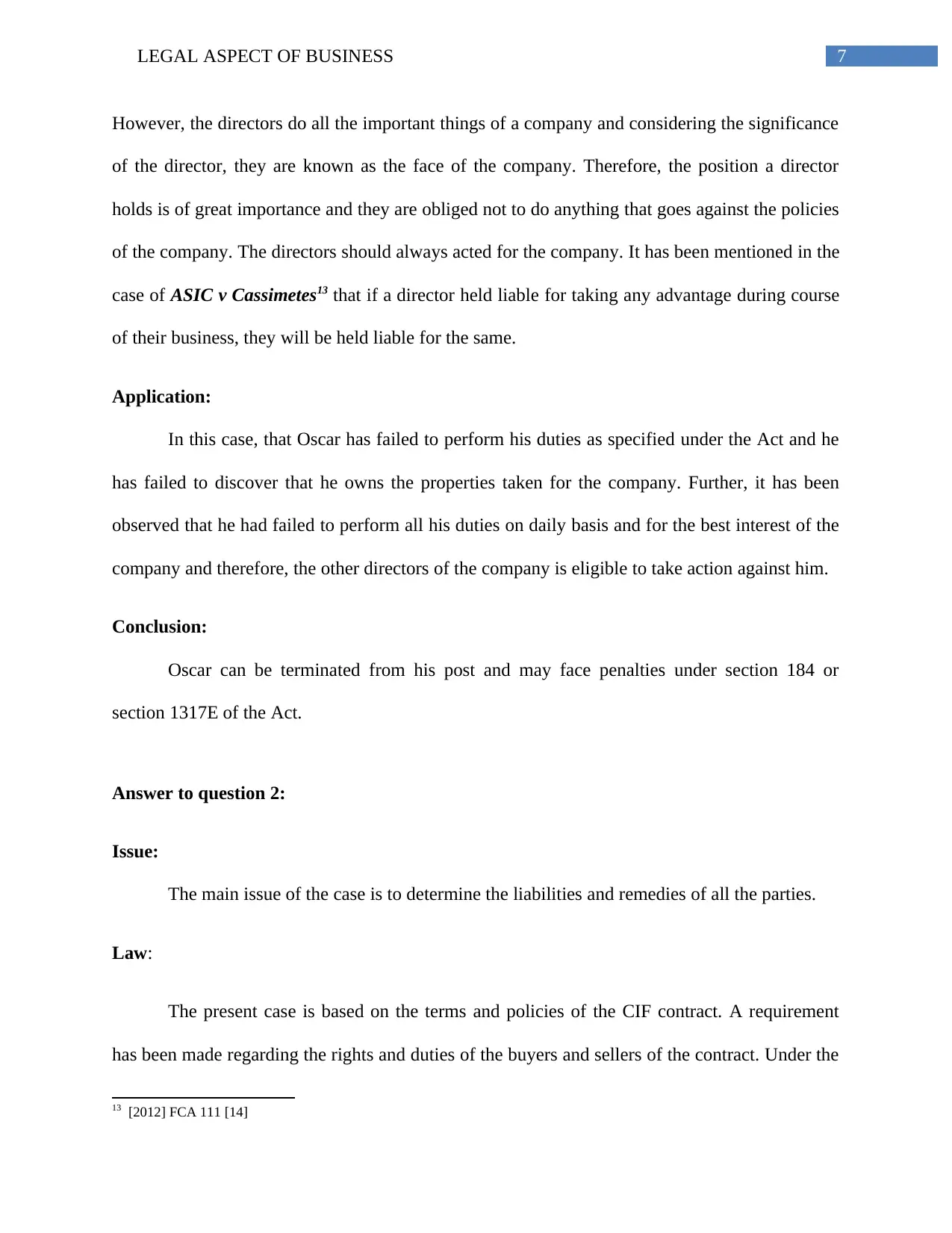
7LEGAL ASPECT OF BUSINESS
However, the directors do all the important things of a company and considering the significance
of the director, they are known as the face of the company. Therefore, the position a director
holds is of great importance and they are obliged not to do anything that goes against the policies
of the company. The directors should always acted for the company. It has been mentioned in the
case of ASIC v Cassimetes13 that if a director held liable for taking any advantage during course
of their business, they will be held liable for the same.
Application:
In this case, that Oscar has failed to perform his duties as specified under the Act and he
has failed to discover that he owns the properties taken for the company. Further, it has been
observed that he had failed to perform all his duties on daily basis and for the best interest of the
company and therefore, the other directors of the company is eligible to take action against him.
Conclusion:
Oscar can be terminated from his post and may face penalties under section 184 or
section 1317E of the Act.
Answer to question 2:
Issue:
The main issue of the case is to determine the liabilities and remedies of all the parties.
Law:
The present case is based on the terms and policies of the CIF contract. A requirement
has been made regarding the rights and duties of the buyers and sellers of the contract. Under the
13 [2012] FCA 111 [14]
However, the directors do all the important things of a company and considering the significance
of the director, they are known as the face of the company. Therefore, the position a director
holds is of great importance and they are obliged not to do anything that goes against the policies
of the company. The directors should always acted for the company. It has been mentioned in the
case of ASIC v Cassimetes13 that if a director held liable for taking any advantage during course
of their business, they will be held liable for the same.
Application:
In this case, that Oscar has failed to perform his duties as specified under the Act and he
has failed to discover that he owns the properties taken for the company. Further, it has been
observed that he had failed to perform all his duties on daily basis and for the best interest of the
company and therefore, the other directors of the company is eligible to take action against him.
Conclusion:
Oscar can be terminated from his post and may face penalties under section 184 or
section 1317E of the Act.
Answer to question 2:
Issue:
The main issue of the case is to determine the liabilities and remedies of all the parties.
Law:
The present case is based on the terms and policies of the CIF contract. A requirement
has been made regarding the rights and duties of the buyers and sellers of the contract. Under the
13 [2012] FCA 111 [14]
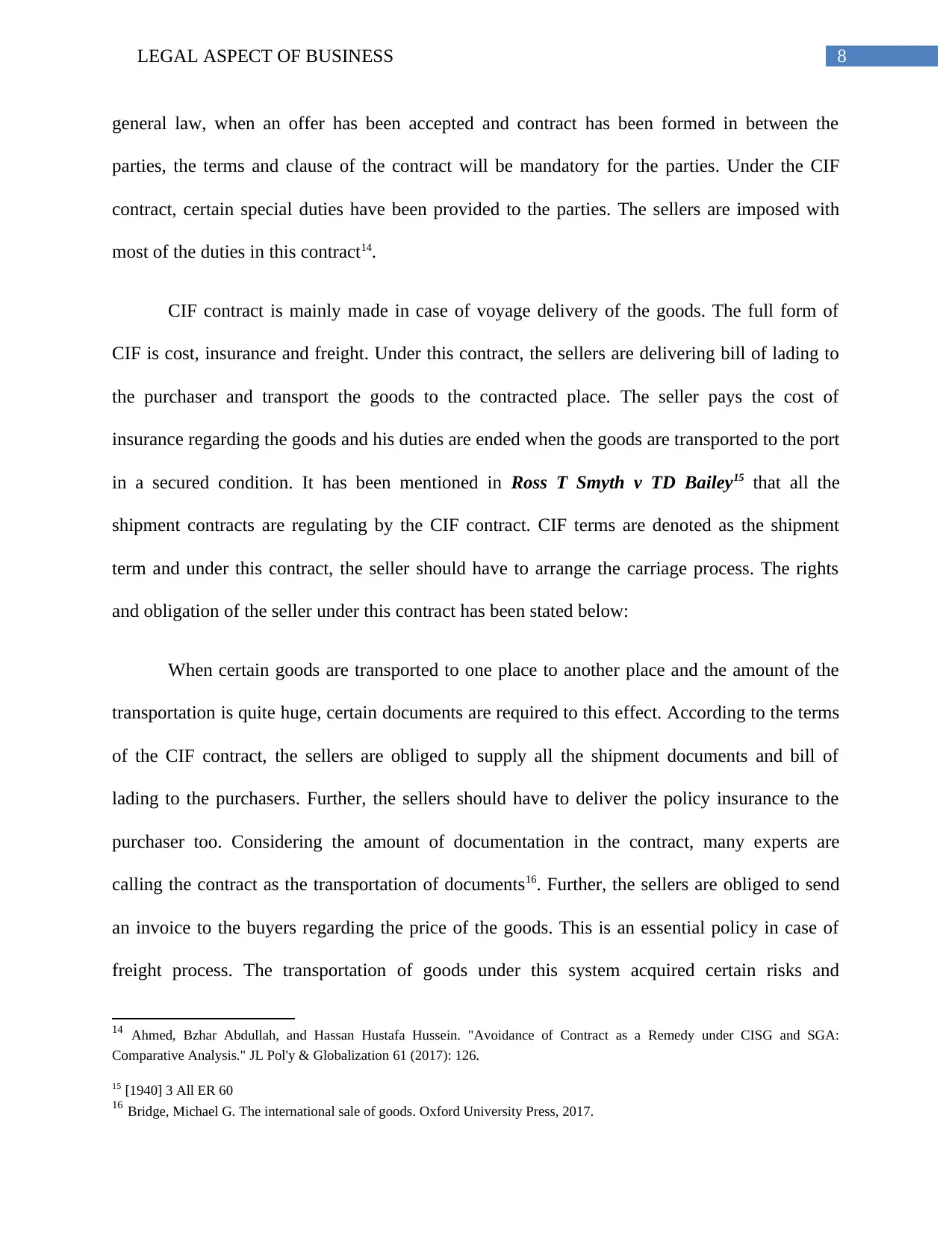
8LEGAL ASPECT OF BUSINESS
general law, when an offer has been accepted and contract has been formed in between the
parties, the terms and clause of the contract will be mandatory for the parties. Under the CIF
contract, certain special duties have been provided to the parties. The sellers are imposed with
most of the duties in this contract14.
CIF contract is mainly made in case of voyage delivery of the goods. The full form of
CIF is cost, insurance and freight. Under this contract, the sellers are delivering bill of lading to
the purchaser and transport the goods to the contracted place. The seller pays the cost of
insurance regarding the goods and his duties are ended when the goods are transported to the port
in a secured condition. It has been mentioned in Ross T Smyth v TD Bailey15 that all the
shipment contracts are regulating by the CIF contract. CIF terms are denoted as the shipment
term and under this contract, the seller should have to arrange the carriage process. The rights
and obligation of the seller under this contract has been stated below:
When certain goods are transported to one place to another place and the amount of the
transportation is quite huge, certain documents are required to this effect. According to the terms
of the CIF contract, the sellers are obliged to supply all the shipment documents and bill of
lading to the purchasers. Further, the sellers should have to deliver the policy insurance to the
purchaser too. Considering the amount of documentation in the contract, many experts are
calling the contract as the transportation of documents16. Further, the sellers are obliged to send
an invoice to the buyers regarding the price of the goods. This is an essential policy in case of
freight process. The transportation of goods under this system acquired certain risks and
14 Ahmed, Bzhar Abdullah, and Hassan Hustafa Hussein. "Avoidance of Contract as a Remedy under CISG and SGA:
Comparative Analysis." JL Pol'y & Globalization 61 (2017): 126.
15 [1940] 3 All ER 60
16 Bridge, Michael G. The international sale of goods. Oxford University Press, 2017.
general law, when an offer has been accepted and contract has been formed in between the
parties, the terms and clause of the contract will be mandatory for the parties. Under the CIF
contract, certain special duties have been provided to the parties. The sellers are imposed with
most of the duties in this contract14.
CIF contract is mainly made in case of voyage delivery of the goods. The full form of
CIF is cost, insurance and freight. Under this contract, the sellers are delivering bill of lading to
the purchaser and transport the goods to the contracted place. The seller pays the cost of
insurance regarding the goods and his duties are ended when the goods are transported to the port
in a secured condition. It has been mentioned in Ross T Smyth v TD Bailey15 that all the
shipment contracts are regulating by the CIF contract. CIF terms are denoted as the shipment
term and under this contract, the seller should have to arrange the carriage process. The rights
and obligation of the seller under this contract has been stated below:
When certain goods are transported to one place to another place and the amount of the
transportation is quite huge, certain documents are required to this effect. According to the terms
of the CIF contract, the sellers are obliged to supply all the shipment documents and bill of
lading to the purchasers. Further, the sellers should have to deliver the policy insurance to the
purchaser too. Considering the amount of documentation in the contract, many experts are
calling the contract as the transportation of documents16. Further, the sellers are obliged to send
an invoice to the buyers regarding the price of the goods. This is an essential policy in case of
freight process. The transportation of goods under this system acquired certain risks and
14 Ahmed, Bzhar Abdullah, and Hassan Hustafa Hussein. "Avoidance of Contract as a Remedy under CISG and SGA:
Comparative Analysis." JL Pol'y & Globalization 61 (2017): 126.
15 [1940] 3 All ER 60
16 Bridge, Michael G. The international sale of goods. Oxford University Press, 2017.
⊘ This is a preview!⊘
Do you want full access?
Subscribe today to unlock all pages.

Trusted by 1+ million students worldwide
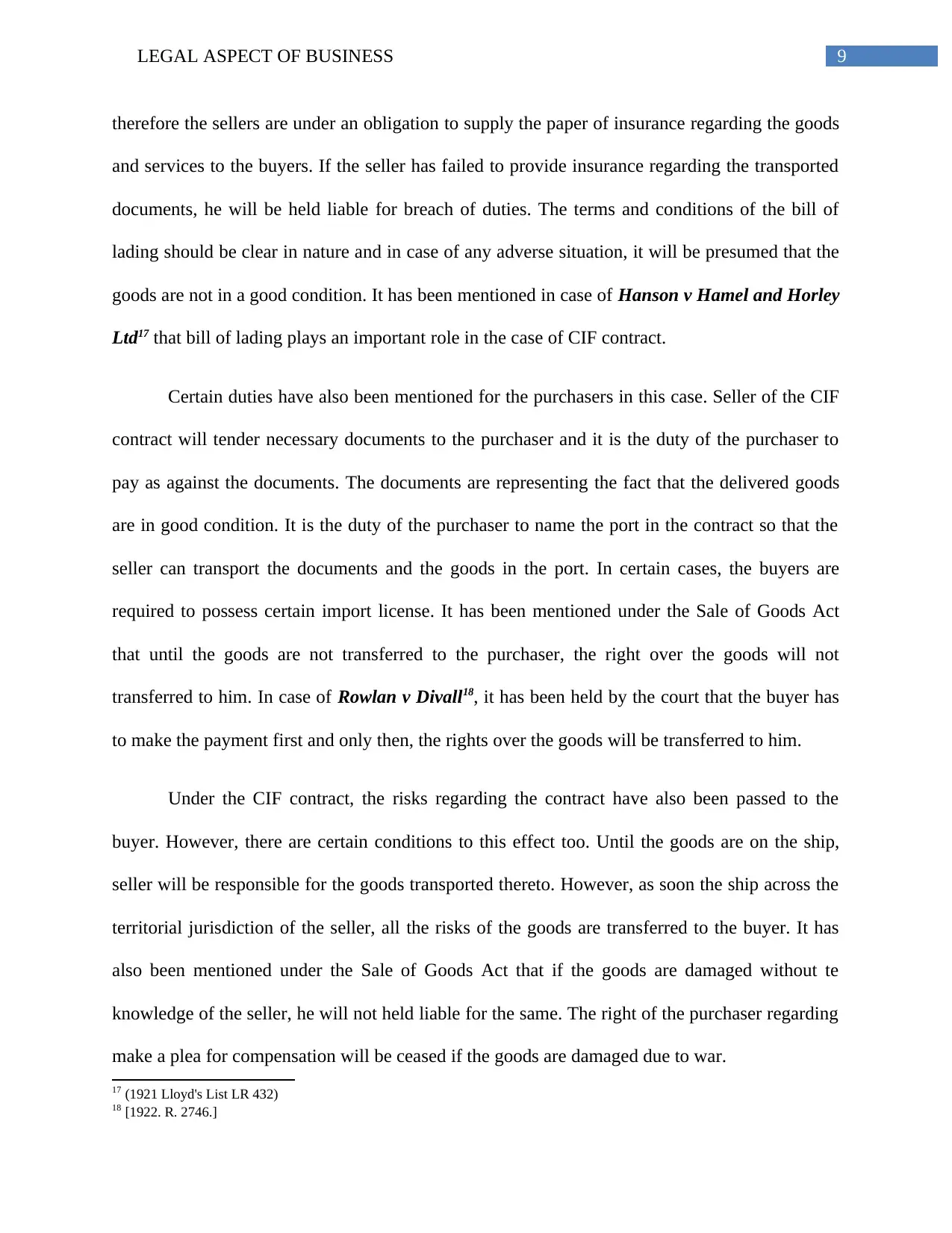
9LEGAL ASPECT OF BUSINESS
therefore the sellers are under an obligation to supply the paper of insurance regarding the goods
and services to the buyers. If the seller has failed to provide insurance regarding the transported
documents, he will be held liable for breach of duties. The terms and conditions of the bill of
lading should be clear in nature and in case of any adverse situation, it will be presumed that the
goods are not in a good condition. It has been mentioned in case of Hanson v Hamel and Horley
Ltd17 that bill of lading plays an important role in the case of CIF contract.
Certain duties have also been mentioned for the purchasers in this case. Seller of the CIF
contract will tender necessary documents to the purchaser and it is the duty of the purchaser to
pay as against the documents. The documents are representing the fact that the delivered goods
are in good condition. It is the duty of the purchaser to name the port in the contract so that the
seller can transport the documents and the goods in the port. In certain cases, the buyers are
required to possess certain import license. It has been mentioned under the Sale of Goods Act
that until the goods are not transferred to the purchaser, the right over the goods will not
transferred to him. In case of Rowlan v Divall18, it has been held by the court that the buyer has
to make the payment first and only then, the rights over the goods will be transferred to him.
Under the CIF contract, the risks regarding the contract have also been passed to the
buyer. However, there are certain conditions to this effect too. Until the goods are on the ship,
seller will be responsible for the goods transported thereto. However, as soon the ship across the
territorial jurisdiction of the seller, all the risks of the goods are transferred to the buyer. It has
also been mentioned under the Sale of Goods Act that if the goods are damaged without te
knowledge of the seller, he will not held liable for the same. The right of the purchaser regarding
make a plea for compensation will be ceased if the goods are damaged due to war.
17 (1921 Lloyd's List LR 432)
18 [1922. R. 2746.]
therefore the sellers are under an obligation to supply the paper of insurance regarding the goods
and services to the buyers. If the seller has failed to provide insurance regarding the transported
documents, he will be held liable for breach of duties. The terms and conditions of the bill of
lading should be clear in nature and in case of any adverse situation, it will be presumed that the
goods are not in a good condition. It has been mentioned in case of Hanson v Hamel and Horley
Ltd17 that bill of lading plays an important role in the case of CIF contract.
Certain duties have also been mentioned for the purchasers in this case. Seller of the CIF
contract will tender necessary documents to the purchaser and it is the duty of the purchaser to
pay as against the documents. The documents are representing the fact that the delivered goods
are in good condition. It is the duty of the purchaser to name the port in the contract so that the
seller can transport the documents and the goods in the port. In certain cases, the buyers are
required to possess certain import license. It has been mentioned under the Sale of Goods Act
that until the goods are not transferred to the purchaser, the right over the goods will not
transferred to him. In case of Rowlan v Divall18, it has been held by the court that the buyer has
to make the payment first and only then, the rights over the goods will be transferred to him.
Under the CIF contract, the risks regarding the contract have also been passed to the
buyer. However, there are certain conditions to this effect too. Until the goods are on the ship,
seller will be responsible for the goods transported thereto. However, as soon the ship across the
territorial jurisdiction of the seller, all the risks of the goods are transferred to the buyer. It has
also been mentioned under the Sale of Goods Act that if the goods are damaged without te
knowledge of the seller, he will not held liable for the same. The right of the purchaser regarding
make a plea for compensation will be ceased if the goods are damaged due to war.
17 (1921 Lloyd's List LR 432)
18 [1922. R. 2746.]
Paraphrase This Document
Need a fresh take? Get an instant paraphrase of this document with our AI Paraphraser
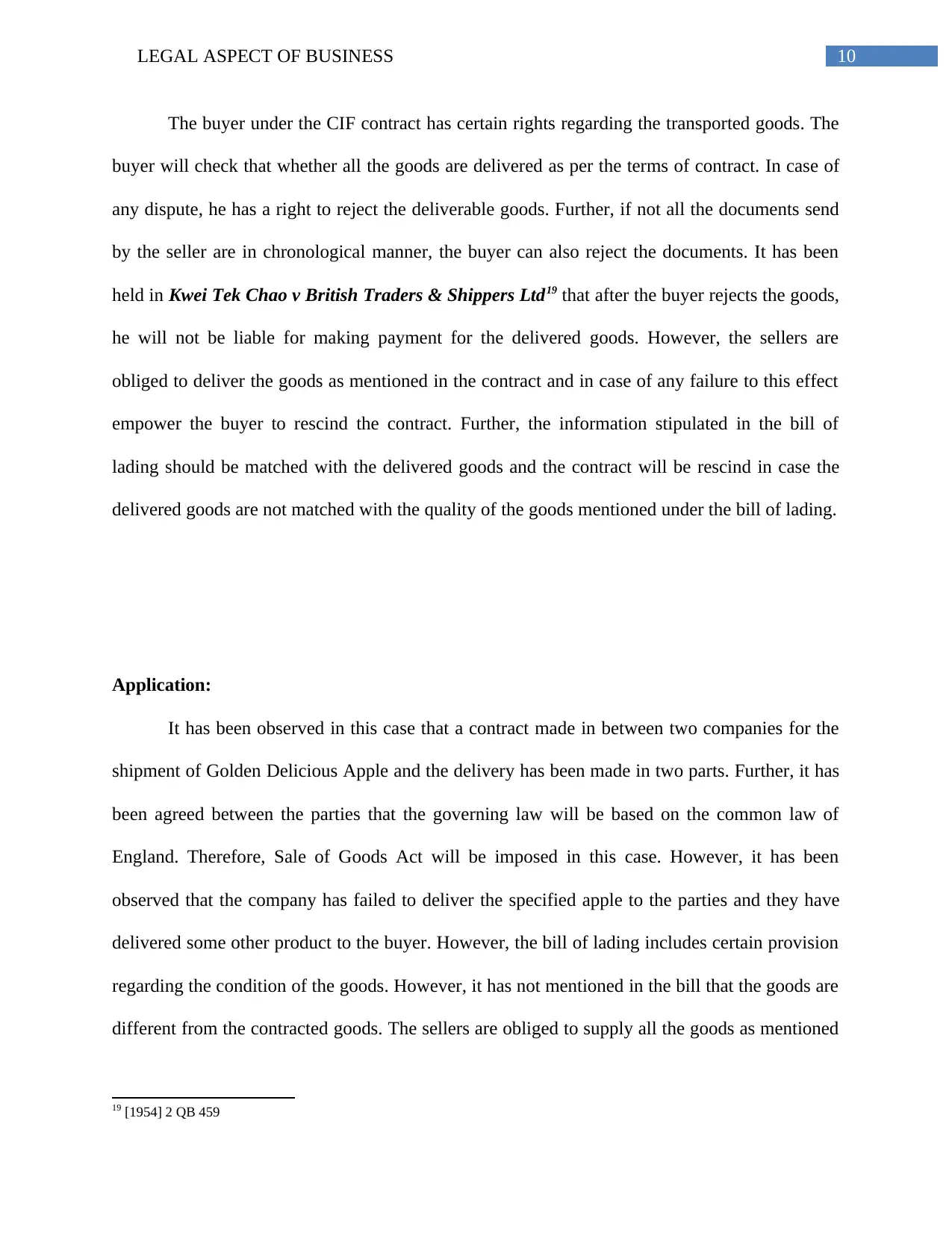
10LEGAL ASPECT OF BUSINESS
The buyer under the CIF contract has certain rights regarding the transported goods. The
buyer will check that whether all the goods are delivered as per the terms of contract. In case of
any dispute, he has a right to reject the deliverable goods. Further, if not all the documents send
by the seller are in chronological manner, the buyer can also reject the documents. It has been
held in Kwei Tek Chao v British Traders & Shippers Ltd19 that after the buyer rejects the goods,
he will not be liable for making payment for the delivered goods. However, the sellers are
obliged to deliver the goods as mentioned in the contract and in case of any failure to this effect
empower the buyer to rescind the contract. Further, the information stipulated in the bill of
lading should be matched with the delivered goods and the contract will be rescind in case the
delivered goods are not matched with the quality of the goods mentioned under the bill of lading.
Application:
It has been observed in this case that a contract made in between two companies for the
shipment of Golden Delicious Apple and the delivery has been made in two parts. Further, it has
been agreed between the parties that the governing law will be based on the common law of
England. Therefore, Sale of Goods Act will be imposed in this case. However, it has been
observed that the company has failed to deliver the specified apple to the parties and they have
delivered some other product to the buyer. However, the bill of lading includes certain provision
regarding the condition of the goods. However, it has not mentioned in the bill that the goods are
different from the contracted goods. The sellers are obliged to supply all the goods as mentioned
19 [1954] 2 QB 459
The buyer under the CIF contract has certain rights regarding the transported goods. The
buyer will check that whether all the goods are delivered as per the terms of contract. In case of
any dispute, he has a right to reject the deliverable goods. Further, if not all the documents send
by the seller are in chronological manner, the buyer can also reject the documents. It has been
held in Kwei Tek Chao v British Traders & Shippers Ltd19 that after the buyer rejects the goods,
he will not be liable for making payment for the delivered goods. However, the sellers are
obliged to deliver the goods as mentioned in the contract and in case of any failure to this effect
empower the buyer to rescind the contract. Further, the information stipulated in the bill of
lading should be matched with the delivered goods and the contract will be rescind in case the
delivered goods are not matched with the quality of the goods mentioned under the bill of lading.
Application:
It has been observed in this case that a contract made in between two companies for the
shipment of Golden Delicious Apple and the delivery has been made in two parts. Further, it has
been agreed between the parties that the governing law will be based on the common law of
England. Therefore, Sale of Goods Act will be imposed in this case. However, it has been
observed that the company has failed to deliver the specified apple to the parties and they have
delivered some other product to the buyer. However, the bill of lading includes certain provision
regarding the condition of the goods. However, it has not mentioned in the bill that the goods are
different from the contracted goods. The sellers are obliged to supply all the goods as mentioned
19 [1954] 2 QB 459
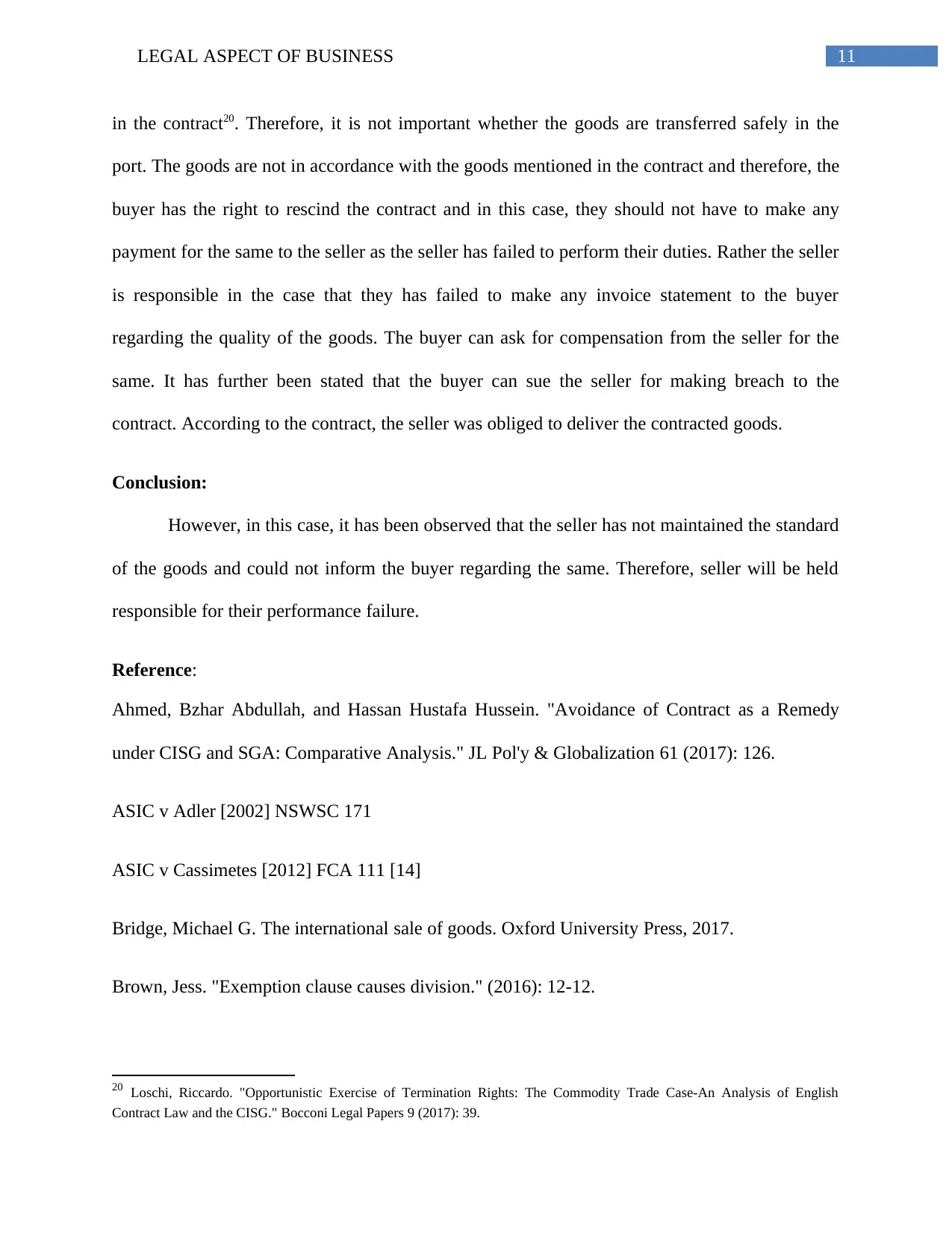
11LEGAL ASPECT OF BUSINESS
in the contract20. Therefore, it is not important whether the goods are transferred safely in the
port. The goods are not in accordance with the goods mentioned in the contract and therefore, the
buyer has the right to rescind the contract and in this case, they should not have to make any
payment for the same to the seller as the seller has failed to perform their duties. Rather the seller
is responsible in the case that they has failed to make any invoice statement to the buyer
regarding the quality of the goods. The buyer can ask for compensation from the seller for the
same. It has further been stated that the buyer can sue the seller for making breach to the
contract. According to the contract, the seller was obliged to deliver the contracted goods.
Conclusion:
However, in this case, it has been observed that the seller has not maintained the standard
of the goods and could not inform the buyer regarding the same. Therefore, seller will be held
responsible for their performance failure.
Reference:
Ahmed, Bzhar Abdullah, and Hassan Hustafa Hussein. "Avoidance of Contract as a Remedy
under CISG and SGA: Comparative Analysis." JL Pol'y & Globalization 61 (2017): 126.
ASIC v Adler [2002] NSWSC 171
ASIC v Cassimetes [2012] FCA 111 [14]
Bridge, Michael G. The international sale of goods. Oxford University Press, 2017.
Brown, Jess. "Exemption clause causes division." (2016): 12-12.
20 Loschi, Riccardo. "Opportunistic Exercise of Termination Rights: The Commodity Trade Case-An Analysis of English
Contract Law and the CISG." Bocconi Legal Papers 9 (2017): 39.
in the contract20. Therefore, it is not important whether the goods are transferred safely in the
port. The goods are not in accordance with the goods mentioned in the contract and therefore, the
buyer has the right to rescind the contract and in this case, they should not have to make any
payment for the same to the seller as the seller has failed to perform their duties. Rather the seller
is responsible in the case that they has failed to make any invoice statement to the buyer
regarding the quality of the goods. The buyer can ask for compensation from the seller for the
same. It has further been stated that the buyer can sue the seller for making breach to the
contract. According to the contract, the seller was obliged to deliver the contracted goods.
Conclusion:
However, in this case, it has been observed that the seller has not maintained the standard
of the goods and could not inform the buyer regarding the same. Therefore, seller will be held
responsible for their performance failure.
Reference:
Ahmed, Bzhar Abdullah, and Hassan Hustafa Hussein. "Avoidance of Contract as a Remedy
under CISG and SGA: Comparative Analysis." JL Pol'y & Globalization 61 (2017): 126.
ASIC v Adler [2002] NSWSC 171
ASIC v Cassimetes [2012] FCA 111 [14]
Bridge, Michael G. The international sale of goods. Oxford University Press, 2017.
Brown, Jess. "Exemption clause causes division." (2016): 12-12.
20 Loschi, Riccardo. "Opportunistic Exercise of Termination Rights: The Commodity Trade Case-An Analysis of English
Contract Law and the CISG." Bocconi Legal Papers 9 (2017): 39.
⊘ This is a preview!⊘
Do you want full access?
Subscribe today to unlock all pages.

Trusted by 1+ million students worldwide
1 out of 14
Related Documents
Your All-in-One AI-Powered Toolkit for Academic Success.
+13062052269
info@desklib.com
Available 24*7 on WhatsApp / Email
![[object Object]](/_next/static/media/star-bottom.7253800d.svg)
Unlock your academic potential
Copyright © 2020–2026 A2Z Services. All Rights Reserved. Developed and managed by ZUCOL.




